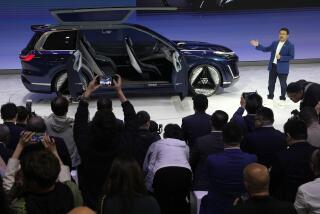WTO begins its 1st probe of China’s trade policies
GENEVA — The World Trade Organization launched its first formal investigation into allegations of illegal Chinese trade practices Thursday, establishing a panel to examine whether China’s tariffs on the import of foreign auto parts break international trade rules.
The complaint was made by the United States, the European Union and Canada, whose first request for a panel was blocked by China in September. Under WTO rules, a panel is established automatically with the second request.
The three trade powers contend that it is illegal for China to apply a tariff for whole cars to the import of parts that make up 60% or more of the value of the finished vehicle.
“These measures discourage auto manufacturers in China from using imported parts in the assembly of new vehicles,” U.S. trade negotiator David Shark told the WTO’s dispute settlement body, adding that the practice could not be justified under the global trade body’s rules.
Beijing has claimed the tariffs are intended to stop whole cars being imported in large chunks to avoid higher tariff rates for finished cars, but the EU and the United States said China had promised not to treat parts as whole cars when it joined the WTO in December 2001.
China’s WTO delegation expressed disappointment that the U.S., the EU and Canada had “ignored China’s arguments and good faith to resolve this dispute through consultations” and proceeded with the panel request, a move it described as unproductive.
A previous dispute between Beijing and Washington over a Chinese tax rebate for semiconductor chips was resolved during the consultation phase, meaning a full WTO investigation was avoided.
China said it would defend its position and interests before the panel. The investigation could last months and even years before a final judgment but could result in punitive tariffs being imposed on Beijing.
China’s auto industry has grown rapidly and is second to the United States. Manufacturers, however, have to source 40% of parts by value in China to avoid the tariff.
More to Read
Inside the business of entertainment
The Wide Shot brings you news, analysis and insights on everything from streaming wars to production — and what it all means for the future.
You may occasionally receive promotional content from the Los Angeles Times.










